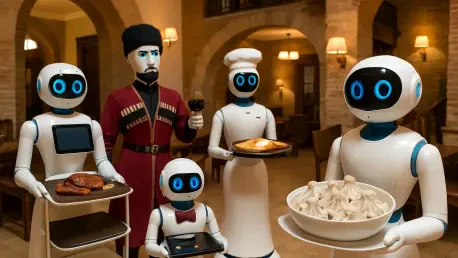In a bustling Mexican restaurant in Roswell, Georgia, diners are greeted not just by the aroma of sizzling fajitas but by an unexpected host—a robot gliding smoothly through the aisles to escort them to their tables. This scene at El Porton Mexican Restaurant showcases a groundbreaking shift in the hospitality industry, driven by To Do Robotics, an innovative startup based in Alpharetta. The integration of robotic technology is redefining customer service in the state, offering a glimpse into a future where automation enhances efficiency without displacing human connection. What began as a novel idea inspired by global trends is now becoming a practical solution in local establishments, addressing labor challenges and captivating patrons with a blend of technology and hospitality. This transformation raises intriguing questions about the balance between innovation and tradition, as businesses adapt to a rapidly evolving landscape while striving to maintain the warmth of personal service.
Pioneering Automation in Dining Experiences
At the heart of this technological wave is To Do Robotics, a company founded on the vision of integrating robots as supportive tools rather than replacements for human staff. At El Porton Mexican Restaurant, these robots are programmed with table layouts and equipped with trays to deliver meals directly from the kitchen, streamlining operations in a way that allows servers to focus on personalized customer interactions. Initially, restaurant staff expressed skepticism about the machines, fearing they might disrupt the workflow or diminish the human touch that defines hospitality. However, as a manager noted, the robots have proven to be a delightful addition, easing repetitive tasks and injecting a sense of fun into the dining atmosphere. Customers, especially younger ones, are drawn to the novelty, often choosing the venue specifically to witness this cutting-edge technology in action. This shift reflects a growing acceptance of automation as a means to enhance, rather than replace, the essence of service, marking a significant milestone in how technology is perceived in everyday settings.
Expanding Horizons Beyond Restaurants
The influence of To Do Robotics extends far beyond the dining room, as the company explores diverse applications of its technology in hotels and healthcare facilities across Georgia. In hotels, robots are already assisting with tasks like cleaning and vacuuming, providing contactless solutions that improve efficiency and hygiene in high-traffic environments. Meanwhile, in healthcare settings, the potential for robots to take vital signs and support medical staff is under active development, promising to alleviate workloads in critical areas. This diversification highlights a broader trend of automation permeating service industries, driven by the need for innovative approaches to operational challenges. Public fascination with these advancements continues to grow, as evidenced by the enthusiasm surrounding robotic assistants in various contexts. Looking back, the journey from initial doubt to widespread acceptance among staff and patrons alike demonstrates a remarkable adaptation to change, setting a precedent for future innovations in hospitality and beyond. As these technologies mature, they pave the way for considering how scalability and integration could further redefine service delivery in the years ahead.









